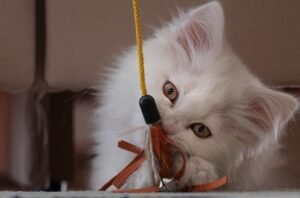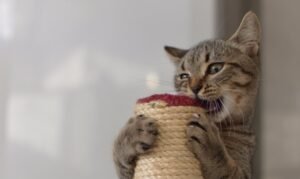How to make a Cat more playful ?
Cats are curious and playful creatures by nature. Playing is fundamental for a cat’s physical health and mental well-being. It also helps to gain trust and strengthens the bond between you and your feline friend. Playing is more important for domestic cats, as they have limited space to practice their hunting behavior compared to outdoor cats. In this CatsandWoofs article, we will discuss how to make your cat play properly, making them happy and affectionate at the same time.
What to Do?
- Hunting-related toys are recommended for developing curiosity.
- Fishing rope-type toys with an allure at the end can boost their hunting practice.
- Interactive toys like interactive ball toys, automated toys, cat puzzles, and cat tunnels are liked by most cats.
- Intelligence toys for cats that dispense treats or food can provide mental stimulation and prevent the cat from getting bored.
- Scratching and biting toys are a smart choice to practice prey behavior and to keep your legs, hands, and other objects in the house from getting wounded.
- Cats can get bored by playing with one or two toys. Offer the cat a variety of toys to stimulate their physical and mental health.
- Providing the cat with a proper diet and fresh water helps keep the cat healthy and active, allowing them to play to their fullest.
- Properly socializing the cat with humans, objects, and other animals helps them become more comfortable in their environment, reducing fear and promoting engagement in play.


What Not to Do?
- Not participating in playtime can make the cat less playful. Daily interaction through play for at least 30 minutes can reduce stress and strengthen the bond with your cat.
- Using laser pointer toys is not recommended as they offer no reward or prey-like achievement at the end. These toys can lead to frustration and bad moods in cats.
- Don’t spread all of their toys around the house. Provide a few toys daily and rotate them regularly to keep things interesting.
- Do not force the cat to play or do anything they do not want to do, as this can cause them to withdraw from you.
- Not understanding cat body language can affect their play behavior. Learning about cat behavior is recommended.
- Cats sometimes need their own space. Engaging them during their personal time can discourage playfulness with you. Be sure to respect their resting time or personal space.

In conclusion, playing patterns and duration vary between cats. A balanced diet, regular vaccinations, and veterinary care are necessary for their health. Daily interaction and affection keep them happy and playful. Never chase, yell at, or punish your cat, as it can cause fear or stress. Provide a positive environment where your cat feels safe and loved.

